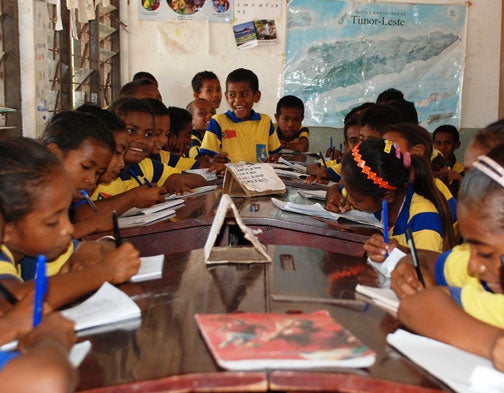
Timor-Leste is making great progress in education, which is considered an important
asset as the country looks to achieve sustainable, long-term development.
Eleven years since the restoration of Independence, Timor-Leste has now emerged from the ashes of destruction that devastated the country. During the conflict, most of the country’s infrastructure was demolished with over 95 percent of schools burnt to the ground.
Lack of infrastructure was only one of the many challenges facing Timor-Leste’s education. During the period of occupation most skilled teachers were not native Timorese and at the end of the conflict many evacuated, leaving very few trained teachers. Only a small number stayed on in the hope of driving education out of the darkness.
Recently, I talked with teachers, students, parents, to hear about their experience in the past, their views about the current state of the education system, and their expectations for the future.
Everyone I spoke to was passionate about the need to focus on education for the future of the country. Fr. Plenio dos Reis Martins, the Director for St. Inacio Loiola, a Jesuit private school at Kaisait in Liquica District shared his views on how important education is.
“The aim of education is to help the young Timorese to be ready to bring this country ahead for tomorrow, because if you don’t have good qualified people here, I don’t think this country can move forward. “
I met with Isaura Cardoso, a teacher at Aitutu primary school in Ainaro district, about 70km drive from the capital, Dili. She followed her mother’s footsteps to become a teacher and loves teaching more than any other job. Isaura was recruited to the National Police Force in 2001, but resigned in 2005 and returned to the school where she had been a volunteer teacher.
I was curious to hear about her experience as a volunteer teacher immediately after the conflict when conditions were most difficult, and she has seen momentous changes over the last ten years.
“In the past we didn’t have any materials. The children had to bring their own mats and sit on the floor, and the teachers had to stand up while teaching because there were no chairs, no table,” Isaura recalls
“We had to teach in very hard and sad times. But it’s our obligation to help build this country, so we had to move forward.”
Now, after a decade things look very different. Access to essential services like health and education has escalated. The number of teachers more than doubled, from 5,700 to over 12,000. Many teachers have been recruited and trained across the country, resulting in better student-teacher ratio from 45:1 to 28:1.
Even with all the progress Timor-Leste has achieved, there are still many challenges. The country has one of the highest rates of population growth in the world, with two thirds of the population currently under the age of 25. This creates a need for more adequately equipped classrooms, better and more teachers and learning materials, and improved access to education across the whole country. Education is an asset as the country looks to diversify its economy away from petroleum and achieve sustainable, long-term development.
According to Luis Ximenes, from Timorese NGO Belun, it’s necessary to be aware of immediate challenges facing the country in terms of skill gaps. Many young people have dropped out of school and now don’t have adequate skills to fill the gaps in the country’s job market.
"To address these immediate challenges higher education and vocational training will be especially important, to help produce higher quality human resources. Timor-Leste also needs more investment from local and International entrepreneurs to provide more job opportunities for young Timorese."
What do you think of Timor-Leste’s progress in education a decade after the country’s independence? And what else can the country do to continue its education? I’d be most interested to hear your thoughts.


Join the Conversation